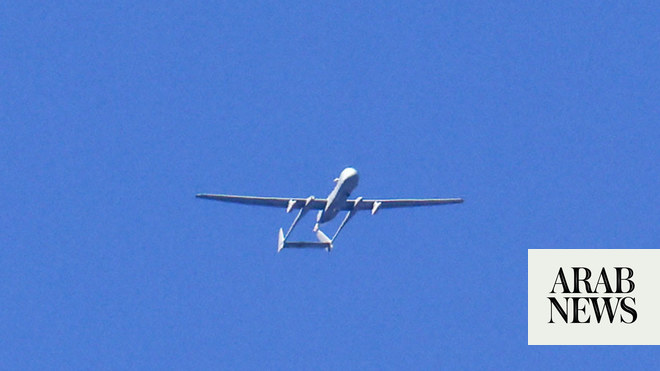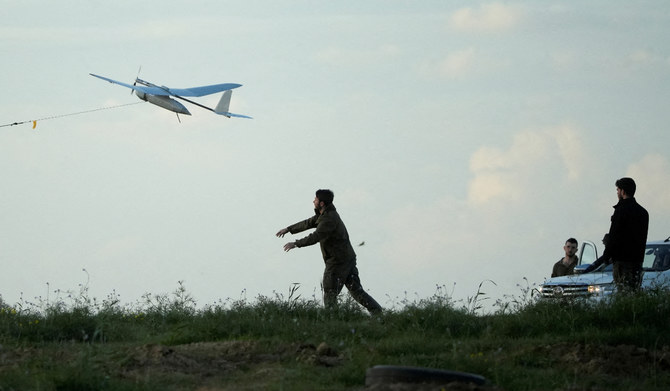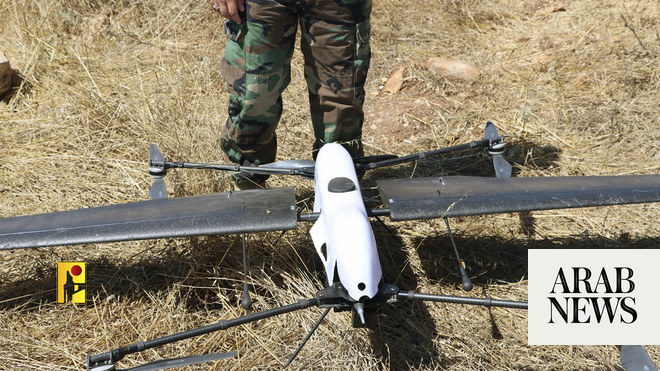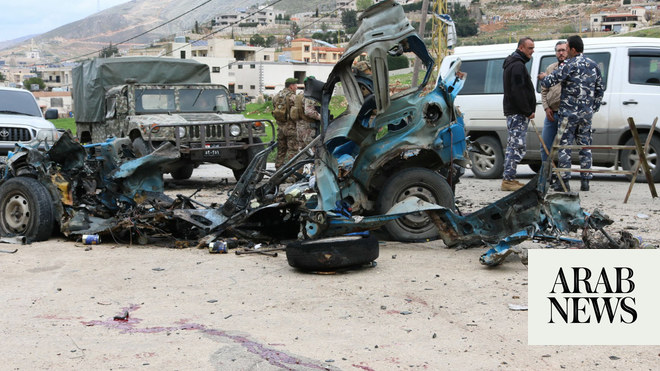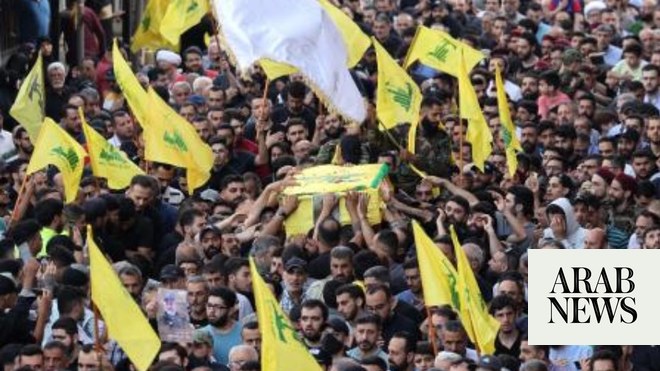
Israeli hacks Lebanese phone network to book hotel in Beirut for 50,000 settlers ‘displaced by Hezbollah, Hamas and Iran’
Israeli combat drones raided the towns of Mays Al-Jabal and an area between the towns of Alma Al-Shaab and Dhayra
BEIRUT: Hezbollah mourned two of its members on Wednesday, the 228th day of confrontations between the group and the Israeli army in southern Lebanon.
The total number of Hezbollah fatalities, along with its affiliated medics and members of its ally, the Amal Movement, has reached 330.
Confrontations continued between the two sides through airstrikes, with both sides employing combat drones in addition to conventional warfare methods.
Israeli combat drones raided the towns of Mays Al-Jabal and an area between the towns of Alma Al-Shaab and Dhayra. Two missiles fired by an Israeli combat drone targeted the town of Aita Al-Shaab.
Israeli artillery shelled the town of Markaba, causing a large fire that civil defense teams worked to extinguish.
The town of Hula was also subjected to Israeli artillery shelling, as were the outskirts of the towns of Tayr Harfa and Alma Al-Shaab.
The two Hezbollah members were killed on Tuesday night in an airstrike by an Israeli drone that targeted the town of Odaisseh; Mohammed Ali Bou Taam (born in 2000) from the town of Taybeh in southern Lebanon, and Ali Hassan Sultan (born in 1991) from the town of Souaneh in southern Lebanon.
Hezbollah targeted several Israeli military sites, including the Ramim barracks, with Burkan missiles, and the Al-Sadah site, and said in a statement that it “directly hit it with artillery shells.”
Brig. Gen. Mounir Shehadeh, the former Lebanese government coordinator to UNIFIL and former head of the military court, said that the escalation on the southern front carried two messages from Hezbollah. The first, he said, was “a response to the repeated threats from Israeli officials to launch a major military operation in southern Lebanon to push Hezbollah to withdraw to the north of the Litani Line. The second message is that the party is ready to escalate if Israel decides to enter Rafah and commit more massacres.”
Shehadeh said that Hezbollah was using new tactics and weapons. He said that targeting the newly established Israeli military sites was an indication of the capabilities it possessed, especially in intelligence and reconnaissance. He added that repeatedly targeting the Meron base and downing two balloons had caused Israel to lose control and air superiority over the northern front, especially as Hezbollah said that it has so far used only 20 percent of its qualitative capabilities.
The Israeli army has rigged combat drones; on Tuesday, a small drone launched by the Israeli army exploded in the direction of a house in the town of Naqoura.
Meanwhile, Israeli Channel 12 website noted “an increase in the use of drones by Hezbollah,” considering that “its lethal capability has increased.”
The website reported that a study conducted by the Alma Center, which specializes in researching the security challenges facing Israel in the north, stated that “24 incidents of drones entering Israeli airspace occurred in March, the number increased to 42 incidents in April, and 20 incidents were recorded in May.”
The website quoted officials at Alma Center as saying: “There is a difficulty related to the way drones fly toward the target.”
Tal Barry, director of research at Alma Center, told Channel 12 that “Hezbollah is using the current battle to evaluate the offensive and defensive capabilities of the Israeli army, and also to compare its capabilities with those of the Israeli army.”
Amid the tension on the southern front and increasing protests by Israeli settlers who were evacuated from settlements in the north, a video spread across Israeli websites, shared on social media, showing an Israeli man appearing on Israeli Channel 12. In the video, the man calls what he claimed to be Caesars Park Hotel (in Beirut), demanding evacuation for himself and thousands of Israelis.
The Israeli caller, speaking in Arabic, asked the person who answered from the hotel: “I am calling from Israel. There are 30, 40, 50 thousand people who need to come to Beirut because of Hezbollah, Hamas and Iran. Do you have any available space?”
The hotel employee responded with surprise, “Where are you from?” The Israeli caller answered in Arabic, “We are from Israel, we are 50, 60 thousand people, we want to come to Beirut to your hotel.” The employee angrily replied, “Go to hell,” and hung up.
The Lebanese hotel employee’s response angered the Israeli caller, who insulted the person on air.
Arab News contacted the hotel on Hamra Street in Beirut to confirm the Israeli call. A hotel source confirmed that the call was received by the employee “through the landline.”
The Israeli caller claimed on the Israeli TV channel that he had previously visited Beirut and stayed at the hotel, but the hotel source strongly denied this.
This Israeli infiltration via phone call was preceded by a similar infiltration at the start of the confrontations. Israelis used the Lebanese phone network to contact dozens of southerners who had evacuated their homes in border regions, inquiring whether they were in their residences or had abandoned them, pretending to be from financial institutions or relief associations. It was later revealed that based on people’s responses, the Israeli side was tracking the movement of Hezbollah members in order to demolish their homes.
The Secretary-General of Hezbollah Hassan Nasrallah revealed these communications and urged people to avoid using the Internet in the border region and to remove external surveillance cameras from homes because of Israeli infiltration. The Israeli army managed to kill a significant number of Hezbollah members by this method.




